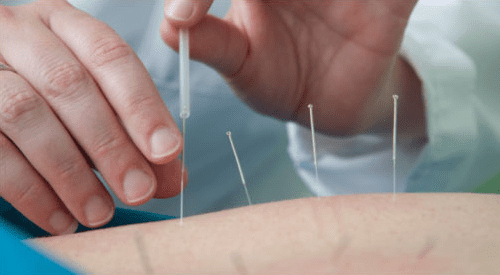The thought of having tiny needles placed all over your body willy-nilly doesn’t sound appealing at all. Lucky for you, acupuncture is a lot more strategic than that. But you’re probably wondering: “Why would I want to get acupuncture in the first place?”
Great! Hold that question.
I have Bipolar Disorder Type I. I’ve been diagnosed for eight years now and have been hospitalized four times within that eight-year span. I have a really stubborn case of mania, but luckily it responds well to psychotropic drugs. Two years ago I had a really stubborn case of depression. Ah, Bipolar, the best of both worlds! Not! The depression lasted a year; it did not respond to the two medications I was on. And to be honest, I was not happy with how my psychiatrist treated my insomnia and depression. Since then I have changed psychiatrists. Note: you are their boss; if you are not happy with your care, do not be afraid to “fire” them and shop around.
A friend of mine is also an acupuncturist and noticed the change in my mood and behavior. She asked if I’d like to receive a treatment. Tired of feeling empty and tired of having random crying spells, I agreed. That was two years ago. I’ve been receiving monthly acupuncture treatments ever since.
There are many different modalities within and styles of acupuncture: Chinese, Japanese, Korean Hand, Auricular, Scalp, Non-Insertion, Cupping, and Moxibustion. My acupuncturist uses a combination of many of these types.
But what is acupuncture all about? According to Sollievo: “Acupuncture needles are inserted in appropriate areas of your body along the meridians to clear the energy blockages and restore and promote healing.”
So what can you expect? First, you’ll have an extensive intake done: questions about your health, diet, medications, and sleep habits, among others. Some acupuncturists might even look at your tongue as a diagnostic tool! The shape, color, coating, texture, among other features, can tell a lot about your health. Your pulse is also taken and your abdomen might be palpated. During the intake you can also share the concerns that brought you to the session in the first place. For instance, I’ve been treated for weight loss, insomnia, depression, mania, headache, and seasonal allergies. Yeah, that’s a pretty broad range of concerns. And that’s not even all of what acupuncture can treat. Acupuncture can treat practically anything.
Getting started. You’ll be asked to wear light clothing. Note: you are not nude during the session. Appropriate clothing could be shorts and a tank top. Depending on what you are treated for you might have both the front side and backsides of your body treated, or just one side. Let’s say you’re on your back. You lie down with your hands by your side, relaxed. You could have your eyes closed or open; totally up to you. The intake and your concerns determine the nature of the treatment session.
Ah, needles. The needles range in size depending on the treatment and on the body part they’ll be used for. In my experience, most of the body parts do not hurt. However, the eyebrows, ears, feet, and the corners of the nose are all very sensitive. With that being said, I bruise very easily. However, in two years of receiving acupuncture, I’ve only bruised twice. Sometimes there is a little blood at the needle site, but a quick dab of cotton ends the bleeding immediately. So no, you should not be afraid of the needles. After the needles are in, you’re left to settle for a while: could be 20 minutes, could be 45 minutes.
Benefits. While I was being treated for depression two years ago, I found the acupuncture to be a lot more effective at improving my mood than the medications I was on at the time. I actually felt normal and alive again after a session. But the catch is that the benefits only lasted three or four days. So I would not recommend foregoing all traditional, Western psychotropic drugs for acupuncture. In terms of the other concerns I was being treated for, I’ve found acupuncture to control my depression better than my mania, the weight loss and insomnia were hard to tell if they were being impacted since I’m on medication, but acupuncture has ended my headaches and nasal congestions pretty quickly. Like, during-the-session-quickly. However, please note that each person responds differently. And depending on your condition(s), it might take longer to treat.
Subsequent appointments. Your acupuncturist will continue to conduct verbal health intake interviews. However, they will be shorter in duration from the first intake meeting. You can choose to focus on the same concerns over multiple sessions, or a new concern each time. You can even tailor your sessions to the moon or the season. For instance, my mania really ratchets up in the spring, so I start getting more frequent sessions in the preceding weeks. And if I am in crisis (mania or depression), I also receive more frequent treatments.
Cost. The price can be prohibitive. Most places that I know of (including my acupuncturist) do not take health insurance. And to see real results, the more frequent you can go, the better.
Conclusion. If you can afford to include this type of treatment in your self-care, I’d highly recommend it. In combination with a balance of Western and Eastern practices, you can’t go wrong.


